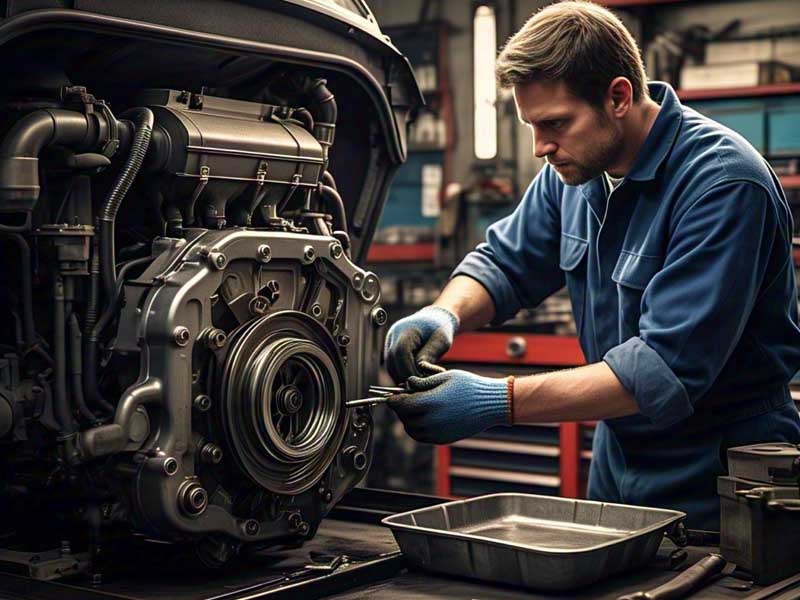
Dieselspecialists – When it comes to vehicle maintenance, few tasks are as crucial as regular oil and filter changes. While many car owners might overlook this routine, it plays a pivotal role in ensuring the longevity, performance, and overall health of your engine. Whether you own a brand-new car or a used one, sticking to an oil change schedule is essential for smooth driving and avoiding costly repairs down the road.
Engine oil acts as the lifeblood of your vehicle’s engine. Its primary function is to lubricate the engine’s moving parts, reducing friction and preventing wear and tear. Oil also helps to cool the engine by dissipating heat, while keeping the engine clean by trapping dirt, debris, and carbon particles. Over time, however, oil breaks down and becomes contaminated with debris and impurities. This is why regular oil changes are so important to keep your engine running smoothly.
When oil becomes old or degraded, it loses its ability to lubricate effectively, which can lead to increased friction between parts. This can result in overheating, reduced engine performance, and even long-term damage to critical components. Regular oil changes ensure that your engine is protected and can operate efficiently.
Along with oil changes, replacing the oil filter is just as important. The oil filter helps trap dirt, dust, and other contaminants that can accumulate in the engine oil over time. Without a clean filter, these impurities can circulate back into the engine, potentially causing damage or reducing the effectiveness of the oil.
A clogged or dirty filter can limit the flow of oil through the engine, leading to inadequate lubrication and inefficient engine operation. By replacing the oil filter with each oil change, you ensure that your engine is receiving the cleanest oil possible, helping to maintain performance and prevent damage.
“Hidden Hutong Food & Beer Tour in Beijing!”
The frequency of oil and filter changes depends on various factors. Including the type of oil used, your vehicle’s make and model, and your driving habits. Traditionally, it was recommended to change the oil every 3,000 miles or every three months. But advancements in engine technology and synthetic oils have extended this interval for many vehicles. Many modern cars can go 5,000 to 7,500 miles between oil changes. While some vehicles with synthetic oil may even last up to 10,000 miles.
However, it’s crucial to follow your car manufacturer’s recommendations, as some vehicles have specific requirements for oil changes. Additionally, if you engage in frequent stop-and-go driving, towing, or drive in harsh conditions. More frequent oil changes may be necessary.
One of the most significant benefits of regular oil and filter changes is the potential for cost savings in the long run. Maintaining proper lubrication and cleanliness inside the engine can prevent costly repairs that may arise from engine damage due to old oil or a clogged filter. For instance, neglected oil changes can result in engine failure, which can cost thousands of dollars to repair or replace.
By investing in regular oil and filter changes, car owners can avoid such expensive repairs and ensure that their vehicle operates smoothly for years to come. Moreover, regular maintenance can enhance fuel efficiency, improving gas mileage and reducing overall operating costs.
Regular oil and filter changes are an essential part of vehicle maintenance that cannot be ignored. By taking the time to change the oil and filter at the recommended intervals. You can protect your engine, improve performance, and extend the life of your vehicle. Remember, preventive maintenance is always cheaper and more effective than costly repairs caused by neglect. So, make oil changes a priority, and your vehicle will thank you with years of reliable service.
“World Sleep Day, Celebrating the Importance of Quality Rest”
Diesel Specialists | Expert Engine Solutions for Diesel, Gasoline & More - Diesel particulate filter failures on Komatsu heavy equipment…
Diesel Specialists | Expert Engine Solutions for Diesel, Gasoline & More - A common rail diesel engine significantly enhances fuel…
Diesel Specialists | Expert Engine Solutions for Diesel, Gasoline & More - heavy duty diesel engines different characteristics set them…
Diesel Specialists | Expert Engine Solutions for Diesel, Gasoline & More - Properly inspect your diesel engine before a long…
Diesel Specialists | Expert Engine Solutions for Diesel, Gasoline & More - the role of fuel injector is crucial in…
Diesel Specialists | Expert Engine Solutions for Diesel, Gasoline & More - big data engine performance monitoring revolutionizes how industries…